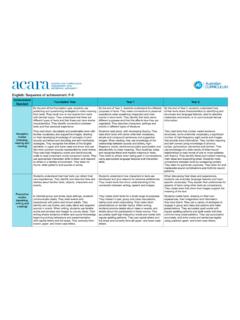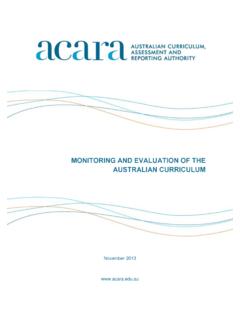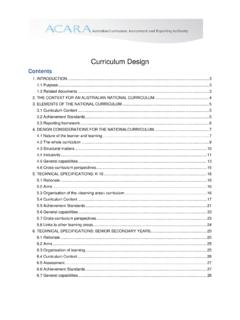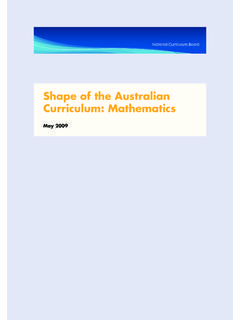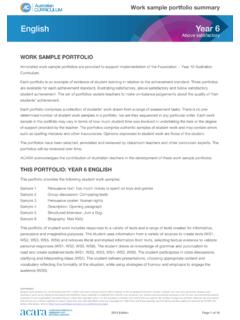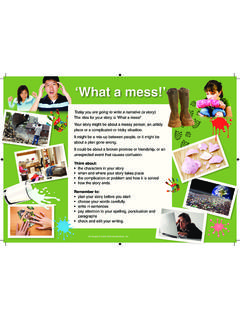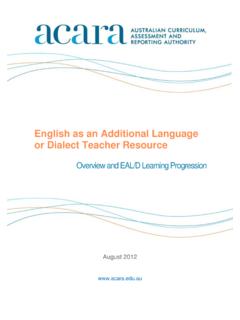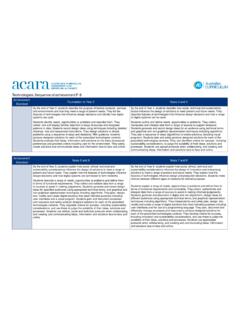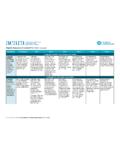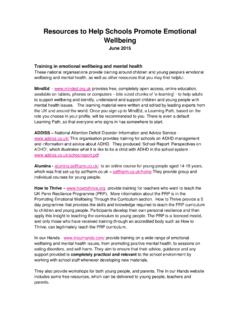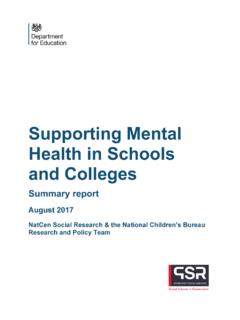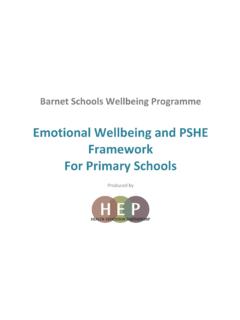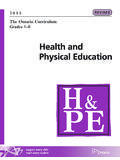Transcription of Australian Curriculum: Health and Physical …
1 Australian curriculum : Health and Physical Education focus areasAlcohol and other drugsThis focus area addresses a range of drugs, including prescription drugs, bush and alternative medicines, energy drinks, caffeine, tobacco, alcohol, illegal drugs and performance-enhancing drugs. The content supports students to explore the impact drugs can have on individuals, families and communities. It is expected that all students at appropriate intervals across the continuum of learning from Foundation to Year 10 will learn about the following: safe use of medicines alternatives to taking medicines the effect of drugs on the body (including energy drinks and caffeine) factors that influence the use of different types of drugs impact of drug use on individuals and communities making informed decisions about drugs (assertive behaviour, peer influence, harm minimisation, awareness of blood-borne viruses) performance-enhancing drugs in and nutritionThis focus area addresses the role of food and nutrition in enhancing Health and wellbeing .
2 The content supports students to develop knowledge, understanding and skills to make healthy, informed food choices and to explore the contextual factors that influence eating habits and food choices. It is expected that all students at appropriate intervals across the continuum of learning from Foundation to Year 10 will learn about the following: food groups and recommendations for healthy eating (including The Australian Guide to Healthy Eating) nutritional requirements and dietary needs (including The Australian Dietary Guidelines) food labelling and packaging food advertising personal, social, economic and cultural influences on food choices and eating habits strategies for planning and maintaining a healthy, balanced diet healthy options for snacks, meals and drinks sustainable food choices. Health benefits of Physical activityThis focus area addresses the influence and impact regular Physical activity participation has on individual and community Health and wellbeing .
3 The content supports students to develop knowledge, understanding and skills to make active choices and to explore the range of influences on Physical activity participation and choices. It is expected that all students at appropriate intervals across the continuum of learning from Foundation to Year 10 will learn about the following: Physical benefits of participating in Physical activities (including impact on Health -related and skill-related components of fitness) benefits of Physical activities based on intensity, nature and frequency social, emotional and cognitive benefits of regular Physical activity social, cultural and environmental influences on Physical activity participation sedentary behaviours and their impact on Health and wellbeing strategies for minimising sedentary behaviour and including Physical activity in daily Health and wellbeingThis focus area addresses how mental Health and wellbeing can be enhanced and strengthened at an individual and community level.
4 The content supports students to develop knowledge, understanding and skills to manage their own mental Health and wellbeing and to support that of others. It is expected that all students at appropriate intervals across the continuum of learning from Foundation to Year 10 will learn about the following: mental Health and wellbeing , and mental Health promotion destigmatising mental illness in the community the impact of Physical , social, spiritual and emotional Health on wellbeing body image and self-worth and their impact on mental Health and wellbeing resilience, and skills that support resilient behaviour coping skills, help-seeking strategies and community support resources networks of support for promoting mental Health and and sexualityThis focus area addresses Physical , social and emotional changes that occur over time and the significant role relationships and sexuality play in these changes. The content supports students to develop knowledge, understanding and skills that will help them to establish and manage respectful relationships.
5 It also supports them to develop positive practices in relation to their reproductive and sexual Health and safety as well as the development of their identities. In doing so, students will gain an understanding of the factors that influence gender and sexual Foundation to Year 2, students will learn about: parts of the body and how the body changes as they grow people who are important to them strategies for relating to and interacting with others assertive behaviour and standing up for is expected that all students at appropriate intervals across the continuum of learning from Year 3 to Year 10 will learn about the following: people who are important to them strategies for relating to and interacting with others assertive behaviour and standing up for themselves establishing and managing changing relationships (offline and online) bullying, harassment, discrimination and violence (including discrimination based on race, gender and sexuality) strategies for dealing with relationships when there is an imbalance of power (including seeking help or leaving the relationship) puberty and how the body changes over time managing the Physical , social and emotional changes that occur during puberty reproduction and sexual Health practices that support reproductive and sexual Health (contraception, negotiating consent, and prevention of sexually transmitted infections and blood-borne viruses) changing identities and the factors that influence them (including personal, cultural, gender and sexual identities)
6 Celebrating and respecting difference and diversity in individuals and focus area addresses safety issues that students may encounter in their daily lives. The content supports students to develop knowledge, understanding and skills to assess risk, make safe decisions and behave in ways that protect their own safety and that of is expected that all students at appropriate intervals across the continuum of learning from Foundation to Year 10 will learn about the following: safety at school safe practices at home, in road or transport environments, in the outdoors and when near water safe and unsafe situations at home, school and parties and in the community strategies for dealing with unsafe or uncomfortable situations safe practices when using information and communication technologies (ICT) and online services, including dealing with cyberbullying managing personal safety first aid and emergency care, including safe blood practices safety when participating in Physical activity, including sports safety, sun safety, use of protective equipment and modifying rules relationship and dating play and minor gamesThis focus area includes learning through which students actively engage in play with people, objects and representations; indoors, outdoors, alone, with a partner or in a group.
7 The content supports students to be physically active and develop skills such as persistence, negotiation, problem solving, planning and is expected that all students at appropriate intervals across the continuum of learning from Foundation to Year 4 will participate in the following: imaginative play small group games minor games lead-up and adventure activitiesThis focus area includes a variety of Physical activities designed to challenge individuals physiologically, behaviourally and socially in diverse contexts and environments. The content supports students to develop knowledge, understandings and skills to assess hazards and manage is expected that all students at appropriate intervals across the continuum of learning from Year 5 to Year 10 will participate in the following: initiative games movement challenges (as individuals and in teams or groups) recreational activities in natural and outdoor settings navigational challenges.
8 Schools could also offer the following activities within this focus area if they have access to specialised facilities and equipment and relevant teacher expertise: bushwalking camping biathlon and triathlon martial arts rock climbing canoeing and kayaking cycling (mountain biking, BMX, road and track cycling) surfing skiing (snow or water) swimming for performance (with a focus on technique).Fundamental movement skillsThis focus area includes the development of fundamental movement skills that provide the foundation for competent and confident participation in a range of Physical activities such as games, sports, dance, gymnastics and Physical is expected that all students at appropriate intervals across the continuum of learning from Foundation to Year 6 will have opportunities to practise and develop the following skills:Locomotor and non-locomotor skills: rolling, balancing, sliding, jogging, running, leaping, jumping, hopping, dodging, galloping, skipping, floating and moving the body through water to safety.
9 Object control skills: bouncing, throwing, catching, kicking and and sportsThis focus area includes the development of movement skills, concepts and strategies through a variety of games and sports. This content builds on learning in active play and minor games and fundamental movement skills. Most games and sports can be classified into; invasion games, net and wall games, striking and fielding games and target is expected that all students at appropriate intervals across the continuum of learning from Year 3 to Year 10 will participate in the following: modified games traditional games or sports culturally significant games and sports (such as traditional Indigenous games and games of significance from the Asia region) non-traditional games and sports (including student-designed games).Lifelong Physical activitiesThis focus area includes Physical activity that can enhance Health -related fitness and wellbeing across the is expected that all students at appropriate intervals across the continuum of learning from Year 3 to Year 10 will participate in the following: individual and group activities active recreation could also offer the following activities if they have access to specialised facilities and equipment and relevant teacher expertise: swimming tai chi, yoga, Pilates bushwalking recreational cycling resistance and expressive movement activitiesThis focus area includes movement that is composed and performed in response to stimuli such as equipment, beats and sounds, images, words or is expected that all students at appropriate intervals across the continuum of learning from Foundation to Year 10 will participate in the following.
10 Creative movement movement exploration dance styles and dance elements. Schools could also offer the following activities if they have access to specialised facilities and equipment and relevant teacher expertise: circus skills rhythmic gymnastics educational gymnastics tai chi, yoga
